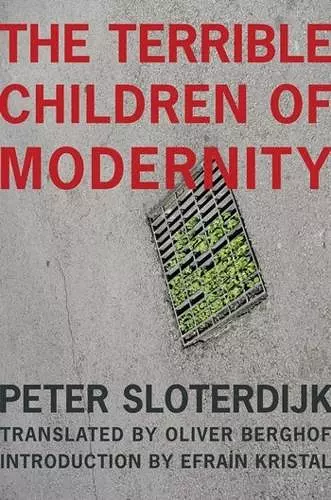The Terrible Children of Modernity
An Antigenealogical Experiment
Peter Sloterdijk author Oliver Berghof translator Efraín Kristal editor
Format:Hardback
Publisher:Columbia University Press
Publishing:10th Jun '25
£100.00
This title is due to be published on 10th June, and will be despatched as soon as possible.

Peter Sloterdijk is among the most acclaimed and widely read philosophers of the past half-century. Called “Germany’s most controversial thinker” by the New Yorker, he has challenged and provoked readers worldwide with extraordinarily ambitious and wide-ranging works of philosophical and cultural critique. In The Terrible Children of Modernity, Sloterdijk offers a magisterial and profound investigation into the vicissitudes of historical change and the nature of modernity.
For Sloterdijk, modernity is defined by its need to break with the past. Moderns are perpetual rebels who seek to sever the ties of tradition and forms of inheritance that bind generations and eras together. With deep philosophical, historical, and literary range, he traces this antigenealogical experiment from the French Revolution onward, from Madame de Pompadour and Napoleon through Nietzsche, Marx, Wagner, the Dadaists, and Deleuze. Acutely aware of the destructive potential of cultural discontinuities, Sloterdijk is no less critical of the “fathers” who condemn change than the “terrible children” who seek a drastic rupture with their predecessors. Equally concerned with the grand sweep of history and our current predicaments, he instead calls for new ways to live together in the intersubjectivity of the human condition. Incisive and daring, breathtaking in its scope, this account of youthful rebellion against tradition asks us to reimagine the ethics of genealogy.
A virtuosic, far-ranging investigation into the costs of denying lineage and heredity by one of Europe's most exciting thinkers and a sober challenge to the idea that our modern mindset frees us from the weight of the past to implement new social and political ideals. -- Ulrich Baer, author of What Snowflakes Get Right: Free Speech, Truth and Equality on Campus
Sloterdijk's The Terrible Children of Modernity is in many respects not only his most important book; it is also a truly prophetic one. In his historically dazzling "genealogy" of the antigenealogical obsessions of modernity as a whole, Sloterdijk enacts with eye-popping panache Nietzsche's famous quip, "nihilism stands at the door." -- Carl Raschke, author of Force of God: Political Theology and the Crisis of Liberal Democracy
The Terrible Children of Modernity offers a cultural historical critique of modernity by concentrating on a single underlying aspect of its world view: the relative loss of moral affiliation with respect to both the preceding and the following generations. He discusses the financial and economic crash of the early twenty-first century as a signal instance of the fact that modern humanity lives, collectively if not individually, in a present uncounseled by the past and irresponsible towards the future. -- Michael Bell, author of Sentimentalism, Ethics, and the Culture of Feeling
The thinking European's Slavoj Žižek...even more intellectually restless and better company" -- Stuart Jeffries * The Guardian *
Without nostalgia for the past, Peter Sloterdijk explores the origins, processes and historical events involving those 'children of Modernity' who are 'terrible' because of their indifference to the fate of those who will come after them. In so doing, the German philosopher underscores his commitment to Friedrich Nietzsche's project of overcoming nihilism after his deconstruction of morals, and his pointed challenges to religion. Sloterdijk also turns one of Martin Heidegger's main preoccupations on its head: he is not interested in Heidegger's solemn engagements with our life projects as we anticipate our deaths, but with our responsibilities to the 'children of the abyss,' that is to say to the lives of those who will inherit the damaged, unsettled planet we are leaving behind. -- Efraín Kristal, UCLA
ISBN: 9780231175326
Dimensions: unknown
Weight: unknown
408 pages